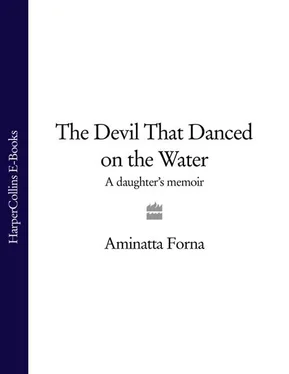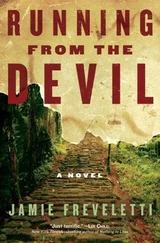From my three-foot-high perspective, my strongest memory of my father is from the waist down: mid-grey slacks, open sandals. I remember the exact shape and hue of his toenails, his strong, muscular thighs and rounded bottom, but the face on the top remains a blur on top of a vaguely light-coloured, short-sleeved shirt and stethoscope. He had a beard at that time, but my memory of him only truly begins when he shaved it off a few months before we left Koidu for good. Most of the time our worlds barely collided, and those moments when they did were the most memorable.
A deranged woman was brought to the clinic. I guess she must have been in her forties, although she looked much older. She snatched at the lappa she was wearing and at her blouse, screamed and started like a mare, and behaved as though unseen hands were pinching her or, I thought, tickling her armpits and squeezing her sides like my uncles did to me in a way that both hurt and made me howl at the same time. The more I shrieked the more they thought I was enjoying it and continued. The family said she was bewitched and they couldn’t look after her any more, so our father put her in one of the rooms in our house, I think with the intention of sending her or driving her himself down to a mental hospital in Freetown. Later the same day I wandered past the window of the room where she was being held and saw her face staring at me behind the mesh of the fly screen. She shouted and her eyeballs reeled. I fled back to Big Aminatta.
Some time later in the afternoon she escaped. Nobody in the house knew how or when, but she couldn’t have been gone long. My father raced to the car and the three of us leapt in behind him, standing on the plastic seats and blaring at the top of our voices that we were off to look for the madwoman. My father drove at speed telling us to keep a look out; he seemed to be enjoying the adventure as much as we were. Everyone was making a riotous amount of noise and we felt no fear.
We hadn’t been gone long when we saw her. She was standing at the side of the road, on the balls of her feet with her back pushed hard against a tree. Her shoulders were drawn up high and she was shrieking. Above her the tree was in flower, decorated with splendid fleshy, coral heads framed by thick petals that grew upright, like hands reaching to the sky. The orange and pink colours made the flamboyant tree look as if it were alight with burning candles. From a distance I could see the woman was staring at a branch from the tree that was lying in the middle of the road. She seemed to be fixated on it, as though it were alive. When we drew nearer I saw the branch wasn’t what I thought at all, but a snake.
The car went straight over it, I felt the bump under my bottom and thighs. A moment later we were in reverse. My father kept going, changing gears backwards and forwards, until after a while I couldn’t feel the point where the snake’s corpse lay on the road any longer. When we were certain it was dead we felt like heroes who had vanquished a dragon.
In my mind’s eye the snake had been enormous, stretching the entire width of the road. As I grew older I thought perhaps I imagined it: no ordinary snake could really be that long. Now, I realise it was almost certainly a twig snake – six foot long, yes, but absolutely harmless. It wouldn’t have wanted anything to do with the madwoman except perhaps to get past her up the tree to lie in peace on its favourite branch.
We drove home with the mad lady now sitting quite calmly between us in the back. The next day she went off to Freetown. I wasn’t there when she was taken away, and when I discovered she was gone, I missed her.
My mud pies were too dry and the sides were crumbling. I’d sloshed water into the mess and begun to swill it all with a stick when Pa Roke showed up. He was my grandfather. Everything about him – the way he dressed in long embroidered gowns with a matching fez, or skull cap, his solemn bearing and formal manners – came from a different age of Africa, one that still existed among the rural people for whom life hadn’t changed in centuries, but was disappearing everywhere else.
Whenever my grandfather arrived he seemed to materialise out of nowhere. Although I’m sure he must have carried his clothes in a bundle, he never appeared to have anything resembling luggage. And when he walked into the compound there was no evidence of the means of transportation he had taken, no bush taxi disappearing in a whirl of dust, no car or bus. Not even a bicycle. He looked as though he had just come from the end of the road instead of Magburaka, where he lived, a whole day’s travel away. By necessity, since there were no telephones and no mail service to speak of, he arrived unannounced and would stay for a few days or sometimes a few weeks.
Because I was the only one at home and he seemed to have little to do during those visits except wait for my father, Pa Roke and I spent our days in each other’s company – although it’s true to say that there was very little contact between the two of us. Pa Roke sat around the house, calling occasionally to Big Aminatta to fetch and carry for him and for the most part ignored me, though it gave me some small pleasure to see Big Aminatta, my own constant nemesis, being ordered around.
Big Aminatta was in awe of Pa Roke, an awe which struck so deep into her core it even altered the way she walked. Usually she swayed her bottom and slid her flip-flopped feet across the floor so that they made an insolent sort of sound, like a market woman hissing through her teeth. In front of our grandfather she took short, fast steps and moved around at quite a clip. She was permanently bent at the waist, as though stuck in a half-curtsy and she never spoke to him, except to say, ‘Yes, Pa,’ keeping her eyes lowered all the while.
I suspect Pa Roke had little time for me. By my age most children were beginning to learn how to be useful. They were started on the smallest of errands, fetching and carrying glasses of water and passing items to their mother. European child that I was, at least in part, I did nothing all day except make mud pies and attempt to divert adult attention. Every now and again I felt Pa Roke watching me, but when I looked at him appealingly I never elicited much by way of response.
In the afternoon Pa Roke accompanied my mother and me on our rounds, taking my place in the front of the car while I was relegated to the back seat. My mother communicated to him using improvised sign language and practising the Temne she had picked up. Her Creole by that time was quite good too, and Pa Roke understood her a little. When all else failed she spoke loudly in English, affecting an African accent, smiling brilliantly. Pa Roke said little but nodded agreeably and smiled back at her, showing the gaps in his teeth, or rather, since he had so few, it would be more accurate to say he displayed the teeth in the gap of his mouth.
He and my mother rubbed along, watching each other through the veils of age, race, gender, language and culture. They seemed fond of each other in the way visitors like the locals in a new place, where everyone welcomes them and people are reduced to cartoons of themselves without nuance, detail or subtlety: a superficial world where everyone laughs and exchanges are full of feigned bonhomie.
When my father arrived home later in the day a transformation came over Pa Roke. He filled out into a real person, talking and laughing, suffering the occasional coughing fit. He even seemed to notice I was in the room and he asked my father about us, pointing in our direction every now and again.
Pa Roke wore mukay , pointed leather shoes, that men used as slippers with the back trodden down. He would slip them off and cross his bare feet at the ankle. Likewise my father took off his sandals. This signalled the beginning of their sessions. They talked for hours together in Temne, who knows what about, since I couldn’t understand a word they said. Perhaps they discussed the cases Pa Roke judged in the villages. My father once took my mother to Magburaka to watch Pa Roke sitting in the barrie and listening to the people’s grievances. One particular case involved a woman and three men. My father explained to my mother that they were watching a paternity suit. My mother tried to follow the proceedings for a while. Then she nudged my father and asked him whether the woman had been asked to name one of these men as the father. My father shook his head. No, he had explained, each of these men wishes to claim the child as his own. No man would ever give up a child that might be his.
Читать дальше












